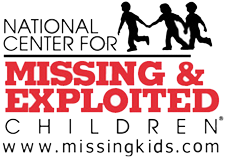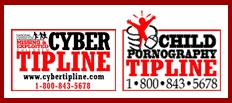General Internet Safety Resources

Stop. Think. Connect.™ is the first-ever coordinated message to help all digital citizens stay safer and more secure online. The message was created by an unprecedented coalition of private companies, nonprofits and government organizations.

The National Cyber Security Alliance's mission is to educate and therefore empower a digital society to use the Internet safely and securely at home, work, and school, protecting the technology individuals use, the networks they connect to, and our shared digital assets.

OnGuardOnline provides practical tips from the Federal Trade Commission to help you be on guard against Internet fraud, secure your computer, and protect your personal information.
Microsoft's Safety & Security Center - Computer security, digital privacy, and online safety.
Resources for Parents/Guardians, Kids & Families

The mission of the National Center for Missing & Exploited Children is to serve as the nation's resource on the issues of missing and sexually exploited children. The organization provides information and resources to law enforcement, parents, children including child victims as well as other professionals.

NetSmartz Workshop is an interactive, educational program of the National Center for Missing & Exploited Children (NCMEC) that provides age-appropriate resources to help teach children how to be safer on- and offline. The program is designed for children ages 5-17, parents and guardians, educators, and law enforcement. With resources such as videos, games, activity cards, and presentations, NetSmartz entertains while it educates.

iKeepSafe has safety, security and ethics tools and resources for helping families and educators teach children to use the Internet safely and wisely.

ConnectSafely is for parents, teens, senior citizens, educators, advocates - everyone engaged in and interested in the impact of the social web. It has all kinds of social-media safety tips for teens and parents, the latest youth-tech news, and many other resources.
Enough is Enough - Making the Internet safer for children and families.
SafeKids.com - SafeKids.com is one of the oldest and most enduring sites for Internet safety.
McAfee's Family Internet Safety
How to Protect your Kids Online | The Ultimate Children’s Protection Guide
How to Report Online Incidents Involving Children
Should any of the following situations arise in your household, via the Internet, text, etc., immediately contact your local or state law enforcement agency, the FBI, and/or the National Center for Missing and Exploited Children.
- Your child received child pornography.
- Your child has been sexually solicited by someone who knows that your child is under 18 years of age.
- Your child has received sexually explicit images from someone that knows your child is under the age of 18.
If one of these scenarios occurs, stop using the computer or device to preserve any evidence and call your local law enforcement agency immediately, and follow their instructions.
The following incidents should be reported immediately to the National Center for Missing and Exploited Children (NCMEC)'s CyberTipline:
- Child Pornography
- Child Prostitution
- Child Sex Tourism
- Child Sexual Molestation (not in the family)
- Online Enticement of Children for Sexual Acts
- Unsolicited Obscene Material Sent to a Child
- Misleading Domain Name
- Misleading Words/Digital Images on the Internet

Please click on the picture above if you have information to help in the fight against child sexual exploitation. Your information will be forwarded to law enforcement for investigation and review and, when possible, to the appropriate Electronic Service Provider(s).
The Department of Justice's Project Safe Childhood is a nationwide initiative to combat the growing epidemic of child sexual exploitation and abuse.
Cyberbullying Resources

StopBullying.gov provides information from various government agencies on how kids, teens, young adults, parents, educators and others in the community can prevent or stop bullying.

The National Crime Prevention Council's Cyberbullying page provides information about stopping cyberbullying before it starts.
Fraud, Identity Theft & Consumer Complaint Resources

The Internet Crime Complaint Center (IC3)'s mission is to serve as a vehicle to receive, develop, and refer criminal complaints regarding the rapidly expanding arena of cyber crime. The IC3 gives the victims of cyber crime a convenient and easy-to-use reporting mechanism that alerts authorities of suspected criminal or civil violations.

The Anti-Phishing Working Group (APWG) is the international coalition unifying the global response to cybercrime across industry, government and law-enforcement sectors and NGO communities through data exchange, research and public awareness.
Fraud.org: A project of the National Consumers League - Help for victims of fraud and tips to help avoid fraud.
Consumer Complaint Resources: A Guide to Internet Fraud - This website has lots of information on different types of fraud, how to protect yourself, and what to do if you become a victim of fraud.
